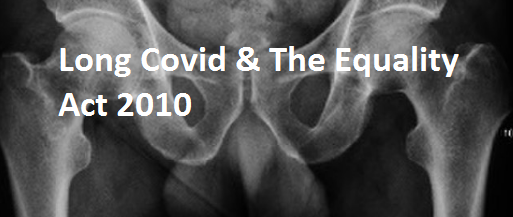
Long Covid is a general term to cover the effects of Covid, once you no longer test positive for the virus. The NHS lists common symptoms of long-covid as including:
- extreme tiredness (fatigue)
- shortness of breath
- chest pain or tightness
- problems with memory and concentration (“brain fog”)
- difficulty sleeping (insomnia)
- heart palpitations
- dizziness
- pins and needles
- joint pain
- depression and anxiety
- tinnitus, earaches
- feeling sick, diarrhoea, stomach aches, loss of appetite
- a high temperature, cough, headaches, sore throat, changes to sense of smell or taste
- rashes
The Equality Act 2010 defines a disability as a) a physical or mental impairment which b) has a substantial and c) long-term adverse effect on d) the person’s P’s ability to carry out normal day-to-day activities.
Taking each part of that definition:
a) Long-covid is most likely to amount to a physical impairment, though the symptoms might be mental. Alternatively, a sufferer’s mental state might be affected by the physical symptoms that they experience.
c) A substantial effect means one that is more than a minor or a trivial effect. In the case of long covid-symptoms, this is going to depend on the particular individual, and how their symptoms affect them. However a sufferer is unlikely to want to claim protection under the Act if the impact of their symptoms are trivial.
d) A long term effect means that the symptoms lasted or are likely to last for a year or more. Hopefully, for most people, the symptoms of long-covid will clear up after a few weeks or months, in which case long-covid will not amount to a disability under the Act. For some unfortunate people, this will not be the case. If their symptoms have clearly lasted a year or more (as evidenced by medical records), they will be one step nearer to satisfying the definition. In the case of someone who (say) has had their symptoms for some months, but not yet a year, they may need to get an expert medical prognosis to pursue a claim.
e) Carrying out every day activities might include activities as diverse as walking the dog, cleaning the house, doing the shopping, the ability to concentrate, the desire to interact with family, friends or relationships, getting out and about, or work. Again, this will depend on the particular individual.
If you think that you are suffering from symptoms of long-covid, and that those symptoms are affecting you in your work, it would normally be wise to notify your employer in writing. If you are disabled under the Act, your disability will be a Protected Characteristic and your employer will then be under a legal obligation to consider making ‘reasonable adjustments’ to accommodate you in your role and not to discriminate against you because of your disability (though this is a complex area not fully summarised in this post).
Therefore, in answer to the question, long-covid might amount to a disability as defined by the Equality Act 2010 for some unfortunate people, though one hopes that the effect will not be too long-lived.

